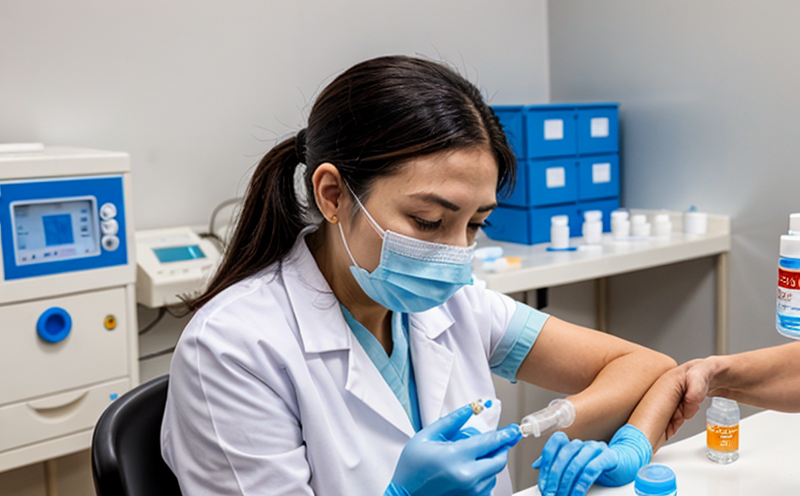USP pH Determination Testing of Vaccine Formulations
The United States Pharmacopeia (USP) pH determination is a critical component in ensuring the quality and safety of vaccine formulations. The USP guidelines provide specific methods for measuring and controlling pH, which are essential to prevent degradation and ensure the stability and efficacy of vaccines.
The pH level of a vaccine formulation plays a significant role in its overall performance. It can influence the stability, solubility, and shelf life of the product. A slight deviation from the optimal pH range can lead to reduced effectiveness or even instability, which could compromise the integrity of the vaccine batch. Therefore, precise and accurate pH determination is paramount.
The testing process involves several steps that are critical for achieving reliable results. The first step is sample preparation, where the vaccine formulation is diluted according to USP guidelines to ensure an accurate measurement. Once prepared, the solution is then analyzed using a pH meter or potentiometric titrator. These instruments provide highly precise readings and can be calibrated to meet strict tolerances.
The acceptance criteria for pH determination are strictly defined in the USP. The range of acceptable pH values varies depending on the specific vaccine formulation being tested, but typically falls within the narrowest possible limits. For instance, a vaccine formulation might have an optimal pH range of 6.5 to 7.5. Any deviation outside this range could indicate potential issues with the manufacturing process or storage conditions.
The significance of USP pH determination testing extends beyond ensuring batch quality. It also aids in the development and optimization of new vaccine formulations. By adhering to these standards, pharmaceutical companies can ensure consistent performance across different batches and lots, enhancing the overall reliability of their products.
In addition to its role in quality assurance, this test is crucial for regulatory compliance. Regulatory bodies like the FDA require that all vaccines meet stringent pH specifications as outlined by USP. Failure to comply with these standards can lead to product recalls or other enforcement actions, which are costly and damaging to a company's reputation.
The precision and accuracy of pH determination testing are achieved through rigorous quality control measures. This includes regular calibration of instrumentation, training of laboratory staff, and adherence to strict protocols for sample preparation and analysis. The use of certified reference materials (CRMs) further enhances the reliability of the test results.
Pharmaceutical companies that prioritize USP pH determination testing are better positioned to meet regulatory requirements and maintain high standards of quality in their products. This not only protects public health but also ensures consumer confidence in the efficacy and safety of vaccines.
Why It Matters
The importance of USP pH determination cannot be overstated, particularly for vaccine formulations. The pH level is a critical factor that affects the stability, solubility, and overall performance of the vaccine. A slight deviation from the optimal range can lead to reduced efficacy or instability, which could compromise the integrity of the vaccine batch.
From a regulatory perspective, adherence to USP standards ensures compliance with international guidelines such as those set by the World Health Organization (WHO) and the FDA. This not only facilitates easier export and import processes but also builds trust with healthcare providers and consumers.
- Quality Assurance: Ensures that each batch of vaccine is consistent in terms of pH, thereby maintaining high standards of quality.
- Regulatory Compliance: Helps pharmaceutical companies meet stringent regulatory requirements, avoiding potential enforcement actions.
- Patient Safety: Reduces the risk of adverse reactions by ensuring that vaccines are stable and effective.
In summary, USP pH determination is essential for maintaining the quality, stability, and safety of vaccine formulations. It plays a pivotal role in ensuring compliance with international standards and protecting public health.
Why Choose This Test
Selecting USP pH determination testing for your pharmaceutical needs offers several advantages that are crucial for maintaining the integrity of your vaccine formulations. The precision and accuracy of this test ensure that each batch meets strict quality standards, thereby enhancing patient safety and confidence.
The reliability of USP pH determination is underpinned by rigorous testing protocols and the use of advanced instrumentation such as pH meters or potentiometric titrators. These instruments provide highly precise readings that are essential for meeting stringent acceptance criteria. Regular calibration ensures that the results remain accurate, contributing to the overall quality assurance process.
Pharmaceutical companies that invest in USP pH determination testing benefit from enhanced regulatory compliance. By adhering to these standards, they can ensure that their products meet international guidelines such as those set by the WHO and FDA. This not only facilitates easier export and import processes but also builds trust with healthcare providers and consumers.
The importance of pH stability in vaccine formulations cannot be emphasized enough. A slight deviation from the optimal range can lead to reduced efficacy or instability, which could compromise the integrity of the vaccine batch. By conducting thorough USP pH determination testing, pharmaceutical companies can ensure that their products are stable and effective, thereby protecting public health.
In conclusion, choosing USP pH determination testing is a strategic decision that enhances quality assurance, regulatory compliance, and patient safety. It ensures that each batch of vaccine meets the highest standards, thereby contributing to the overall integrity and reliability of pharmaceutical products.





